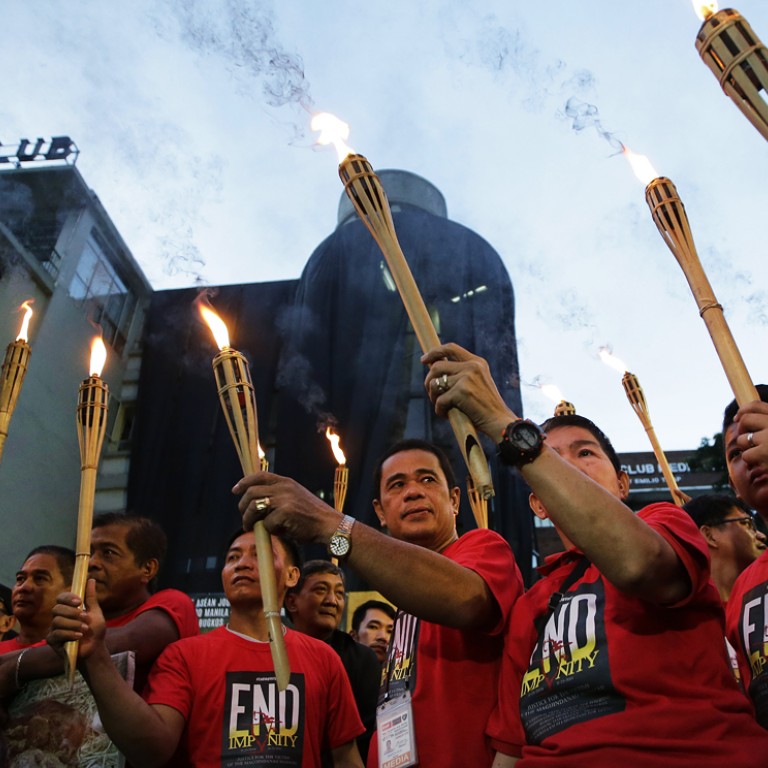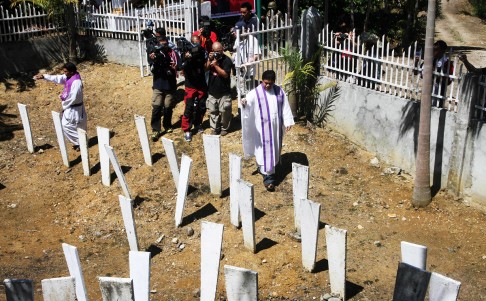
Families of 58 killed in 2009 Philippine massacre demand swifter justice
Five years after political killings in southern Philippines, relatives of the 58 dead fear case against clan leaders and others will drag on for years
Five years after 58 people were killed in the Philippines' worst political massacre, anger among victims' relatives is building, with no one yet convicted and the alleged masterminds still enjoying power.
Nine leaders of a clan accused of orchestrating the slaughter are among dozens on trial in Manila, but there are deep concerns the proceedings could take many more years and that witnesses are being killed or intimidated.
"Sometimes we feel hopeless, that this is all going nowhere," said Noemi Parcon, whose husband was among 32 journalists killed in the massacre, as she attended the trial this week. "We'd be happy even if only the principals are convicted."
The leaders of the Ampatuan family, who ruled the impoverished southern province of Maguindanao, are accused of organising the killings on November 23, 2009, in a bid to quash an election challenge from a rival clan.
Andal Ampatuan Snr had ruled Maguindanao as governor for about a decade under the patronage of then-president Gloria Macapagal-Arroyo, who had funded a private army for the clan as a buffer against Muslim separatist rebels.

The victims' bodies were found in roadside pits dug using a government-owned excavator. Father and son, plus seven other Ampatuans, are among 111 people detained in Manila while on trial. They deny murder.
Seventy-nine suspects, including nine Ampatuans, remain at large.
Amid fears the trial could take decades, the Supreme Court last year took steps to speed up proceedings, including the scheduling of twice-weekly hearings instead of once a week.
President Benigno Aquino has also said he wants verdicts against the Ampatuan leaders announced by the time he stands down in mid-2016.
Harry Roque, a private prosecutor representing the families of 13 victims, said he expected verdicts against the main defendants next year. But chief prosecutor Archie Manabat said he could not give any time frame.
The court is currently focused on petitions for bail by the Ampatuan leaders. Human Rights Watch said in a statement to mark the five-year anniversary that the case was in "effective judicial limbo".
"Bail petitions and testimony challenges by the defence lawyers … have overwhelmed the court," Human Rights Watch's deputy director for Asia, Phelim Kine, said in the statement.
Meanwhile, human rights groups and victims' relatives say witnesses are being killed or intimidated in a bid to sabotage the case.
Four people who had already given testimony or were scheduled to, as well as three relatives of potential witnesses, have been murdered over the past few years. On Tuesday, a Maguindanao man who had agreed to testify was the latest to be killed. A second would-be witness was wounded in the attack, a roadside ambush by gunmen.
Erlyn Umpad, whose television cameraman partner was among those murdered, said she and many other relatives of victims would never give up their quest for justice.
"I want them put away for life. They need to suffer too, just like me," the 25-year-old said at the trial this week.
